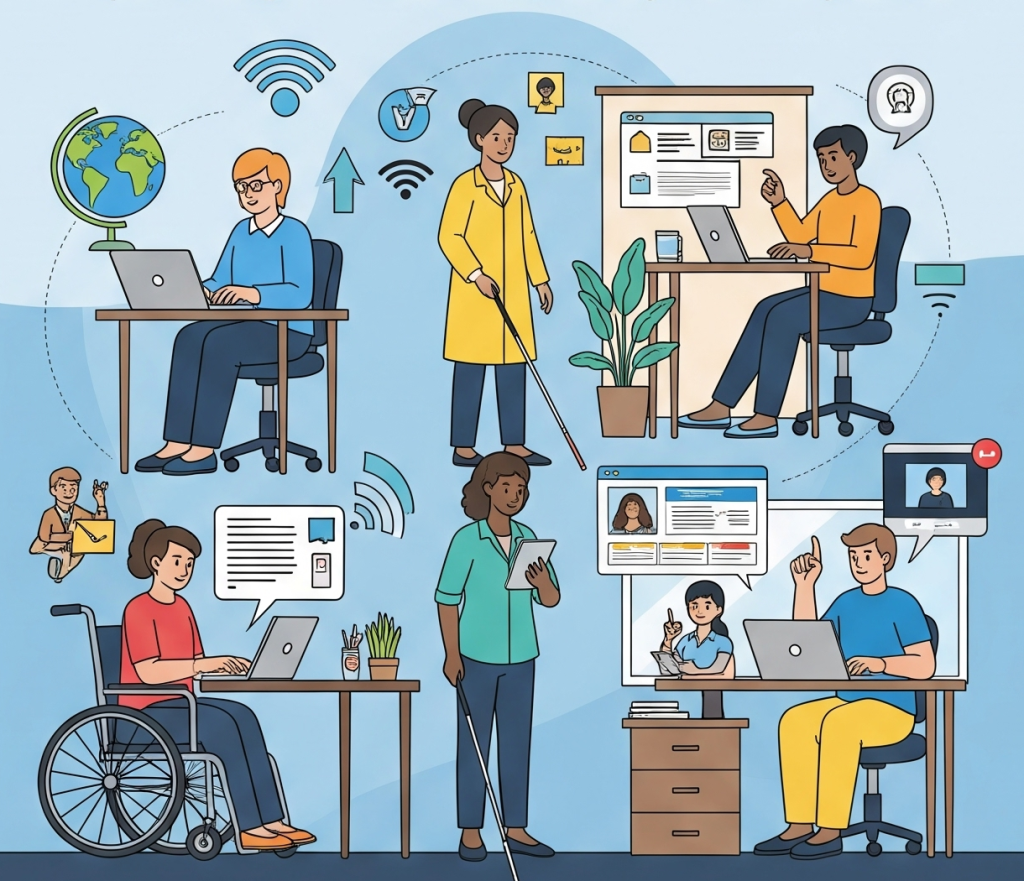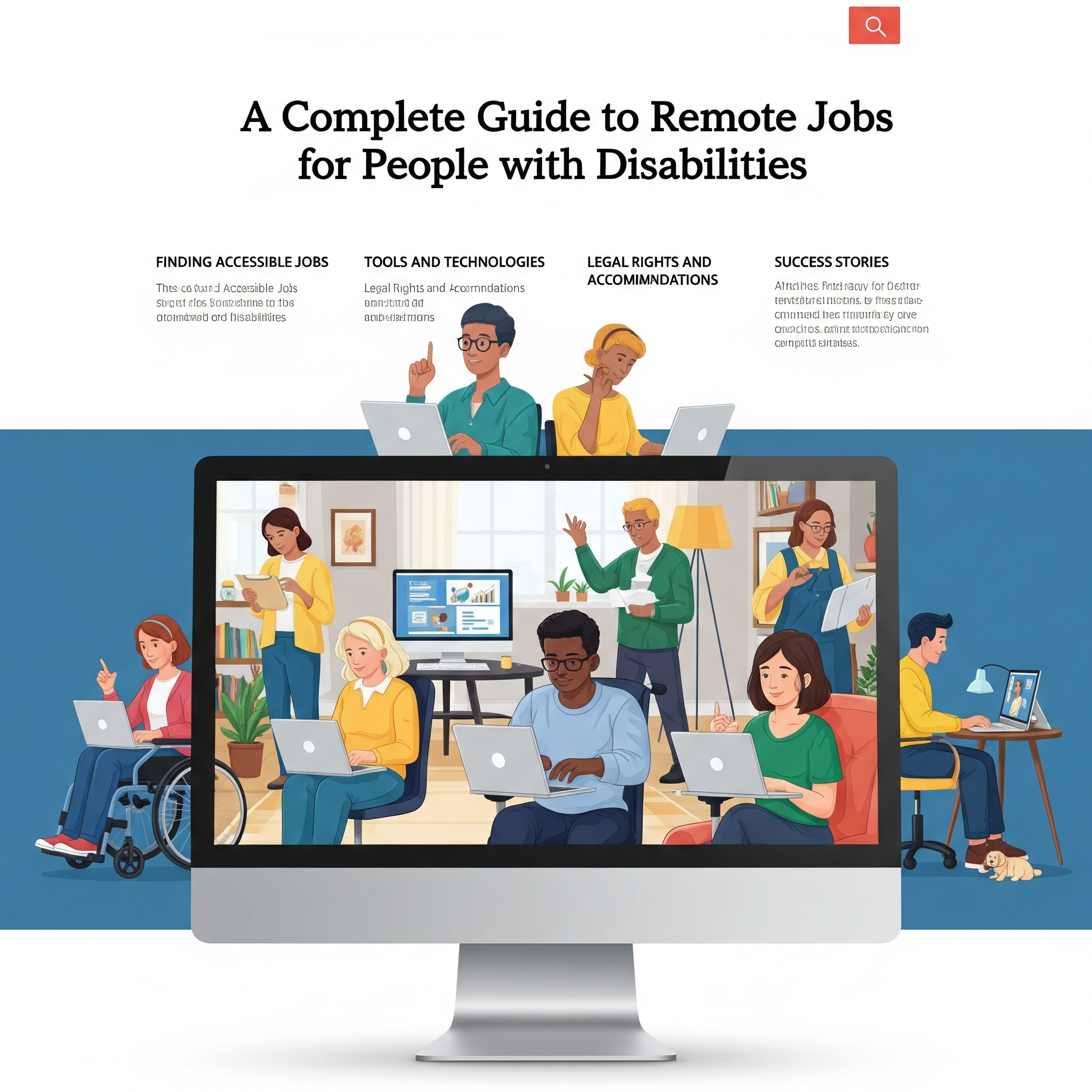Introduction
In today’s digital-first world, remote jobs for people with disabilities are no longer a luxury—they’re a necessity and a game-changer. Remote work has opened doors for millions of professionals who once faced physical, social, or accessibility barriers in traditional workplaces. For individuals with disabilities, working remotely offers flexibility, equal opportunities, and the ability to thrive in careers without the limitations of commuting or navigating inaccessible environments.
This complete guide on remote jobs for people with disabilities explores the benefits, top career paths, job boards, tools, and strategies to help you land the right opportunity. Whether you’re just beginning your career journey or seeking a career switch, this guide will help you unlock your potential.
You can read the summary here.
Why Remote Jobs Matter for People with Disabilities
1. Breaking Accessibility Barriers
Traditional office spaces may not always be designed with accessibility in mind. Remote jobs eliminate daily physical barriers like transportation, stairs, or inaccessible infrastructure.
2. Flexible Schedules
Many remote jobs allow flexible working hours, giving individuals with disabilities the freedom to manage their health needs alongside professional responsibilities.
3. Equal Opportunities
Remote work focuses on skills and results, not physical presence. This levels the playing field for candidates with disabilities competing in a global workforce.
4. Reduced Costs and Stress
Commuting, office attire, and navigating public spaces can add stress and expenses. Remote work reduces these burdens significantly.
Best Remote Jobs for People with Disabilities
Here are some top career options that offer accessibility, growth, and long-term stability:
1. Customer Support Specialist
- Assisting customers via chat, phone, or email.
- Requires good communication and problem-solving skills.
2. Data Entry Specialist
- Suitable for detail-oriented individuals.
- Flexible, low-stress, and requires minimal training.
3. Virtual Assistant
- Handling emails, scheduling, and admin tasks.
- Perfect for organized individuals with multitasking abilities.
4. Freelance Writing & Editing
- Blogs, articles, copywriting, or technical writing.
- Ideal for creative minds and those with strong writing skills.
5. Online Teaching or Tutoring
- Teaching languages, academics, or professional skills.
- Platforms like VIPKid or Tutor.com are accessible.
6. Graphic Design & Video Editing
- Creative roles with high demand.
- Accessible design software makes it easy to work remotely.
7. Web Development & Coding
- Skills-based job that can be done fully online.
- Platforms like GitHub and Upwork offer opportunities.
8. Social Media Manager
- Managing brand accounts, creating content, and analyzing growth.
- Great for those who enjoy communication and digital trends.
Tips to Land Remote Jobs with a Disability
1. Highlight Your Skills, Not Limitations
Employers care about results. Emphasize your abilities, achievements, and strengths.
2. Build a Strong Online Presence
Maintain an updated LinkedIn profile and portfolio showcasing your skills.
3. Consider Disclosing Strategically
Disclosing your disability is a personal choice. Some employers value transparency, while others may focus only on skills.
4. Leverage Disability-Friendly Networks
Join communities like National Disability Institute or Job Accommodation Network (JAN) for support and guidance.
5. Upskill Continuously
Free platforms like Coursera, Udemy, and Khan Academy provide training in digital skills, making you more competitive.
Benefits of Remote Work for Employers Hiring People with Disabilities
Remote hiring is not only beneficial for employees but also for businesses:
- Diverse Workforce – Encourages inclusivity and innovation.
- Larger Talent Pool – Access to skilled professionals worldwide.
- Improved Retention Rates – Flexible jobs reduce turnover.
- Positive Brand Image – Demonstrates corporate responsibility.
Challenges People with Disabilities May Face in Remote Jobs
While opportunities are abundant, some challenges remain:
- Digital Accessibility Gaps – Not all platforms or software are fully accessible.
- Isolation – Lack of social interaction can affect mental health.
- Workplace Bias – Misconceptions about disabilities may still exist.
- Technology Costs – Assistive devices and reliable internet can be expensive.
Conclusion
Remote jobs are not just work opportunities they’re pathways to independence, empowerment, and inclusivity for people with disabilities. By leveraging technology, choosing the right career path, and connecting with inclusive employers, individuals with disabilities can unlock rewarding and flexible career opportunities.
The future of work is remote and accessible. If you’re ready to start your journey, explore inclusive job boards, build your digital skills, and take the first step toward a fulfilling remote career.
Start applying today, and turn your skills into opportunities no barriers attached.
Explore Best Job Tool, a dynamic career platform designed to empower professionals with job resources, career guidance, industry insights, and practical tools. Whether you’re seeking remote opportunities, onsite roles, or hybrid careers, Best Job Tool helps you stay ahead in today’s evolving job market and achieve lasting success.




